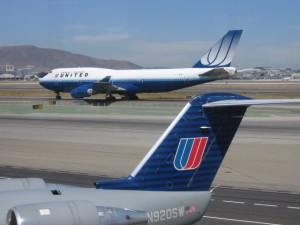By Nicholas Kralev
The Washington Times
November 23, 2009
If you thought complaints about a policy of your preferred airline would fall on deaf ears, last week proved you wrong. As travel companies struggle to survive the economic crisis, they are increasingly listening to their most loyal customers.
As I reported in this column, United Airlines announced last month that it soon would end advance domestic upgrades, which could be confirmed using electronic certificates top elite travelers get if they fly at least 10,000 miles per quarter.
Though United tried to mask that huge loss for its best customers with the promise of automatic “free upgrades” if space in first or business class is still available a couple of days before a flight, the outcry against the new policy was overwhelming.
The customers who receive the certificates in question, known as confirmed regional upgrades, are those flying at least 100,000 miles a year. They are designated as 1K members of United’s Mileage Plus program. Many of them said one of the main reasons they worked hard to qualify for 1K status for next year was to earn regional upgrades. Thus, they were understandably angry when they were told that, beginning in the second quarter of 2010, certificates would no longer be issued.
“I was so upset,” said Jonathan Adkins, a Capitol Hill trade group representative. “The main reason I wanted to get 1K status was to earn [certificates] so I can gift them to friends and others who may not be traveling on my itinerary.”
Absent confirmed regional upgrades, the only way to sponsor others traveling independently is by using miles, but United is introducing cash co-pays for such upgrades in January, and they can be rather steep.
“I’ve written, faxed, called and e-mailed United to restore” the regional upgrades, which can be used for flights in North America — including Canada and Hawaii — as well as Central America and the Caribbean, Mr. Adkins said.
After receiving many more complaints, accompanied by numerous posts in online travel forums such as FlyerTalk, United calculated that the ill will generated by last month’s decision was likely to cost the airline more in the long term than keeping the regional upgrades.
“We’ve carefully read your feedback about next year’s change to our domestic upgrade offering,” Mileage Plus Vice President Robert Sahadevan said in a letter to elite members. “Notably, we heard what you had to say about how important confirmed regional upgrades are to you. We’ve listened. We are going to continue issuing confirmed regional upgrades to our 1Ks.”
Within minutes, the praise and gratitude United received on FlyerTalk and on several travel blogs matched the criticism it had attracted previously.
“I’m delighted they have done so,” Mr. Adkins said. “They are keeping me very loyal.”
Mr. Sahadevan also announced that, beginning in mid-2010, Mileage Plus elite members will qualify for free domestic upgrades on Continental Airlines if space is available a couple of days before the flight. Top members of Continental’s OnePass program will enjoy the same benefit on United flights as part of the two carriers’ closer cooperation, which many in the industry expect to culminate in a merger.
“Many of you have asked about our strategy,” Mr. Sahadevan wrote. “It is simple: to make Mileage Plus the most rewarding loyalty program and the only one you will ever need.”
This was not the first time United acted under pressure from its customers. Last year, it had to abandon plans to charge for food in coach on flights from Washington to Europe.
US Airways and Continental also have backtracked on unpopular changes they made to their frequent-flier programs after loud and persistent complaints from customers.
United’s decision last week to reverse a publicly announced policy showed that the Mileage Plus management understands the value of loyalty for United’s long-term well-being at a time when most airlines are concerned chiefly with short-term financial benefits. That obsession has brought all the extra fees those airlines have charged in the past year.
Having been a 1K member for nearly a decade, I finally noticed a shift in the thinking of the Mileage Plus leadership when Graham Atkinson, a former United vice president with substantial customer-service experience, became president of the loyalty program last year.
Too bad he can do little about United’s blocking of award seats made available for mileage redemption by its partners in the global Star Alliance — a policy that began long before Mr. Atkinson took over.
This column was first published by The Washington Times

